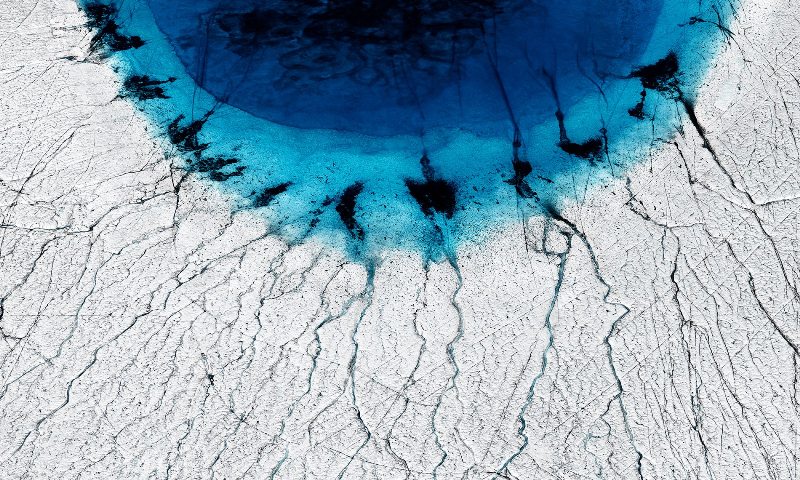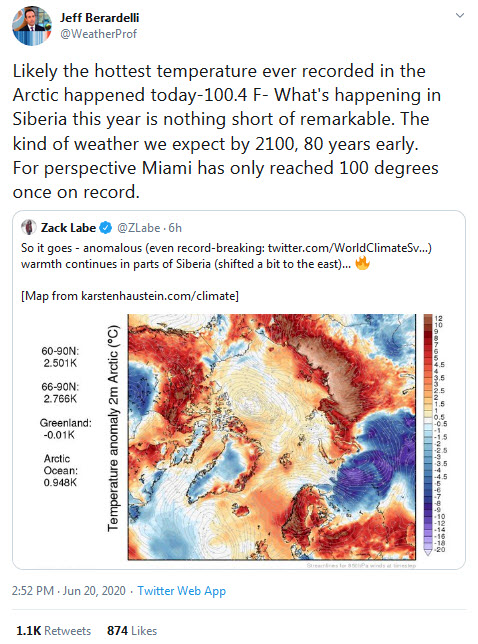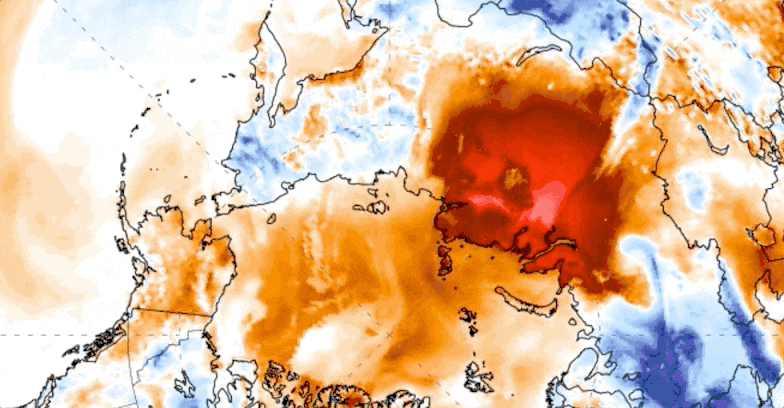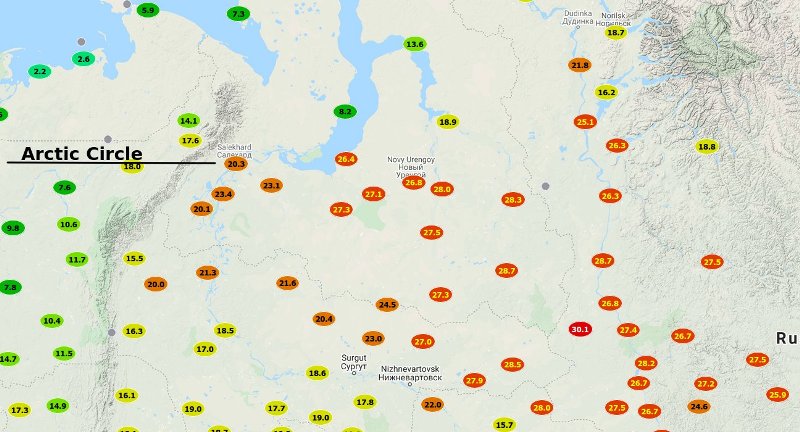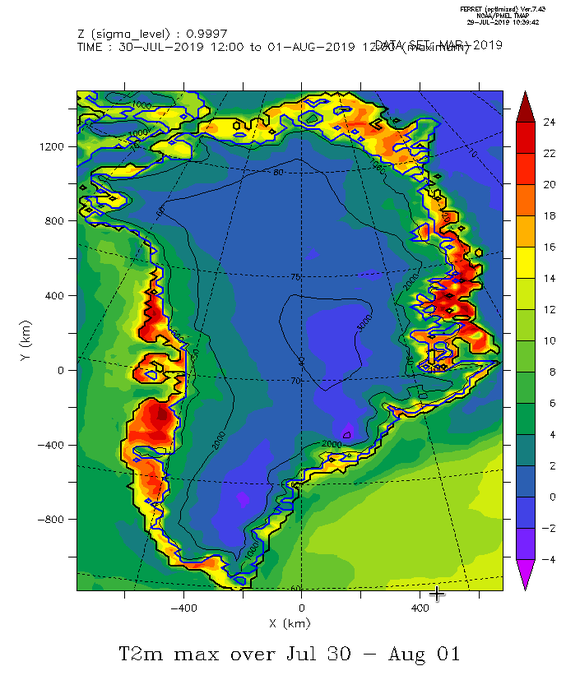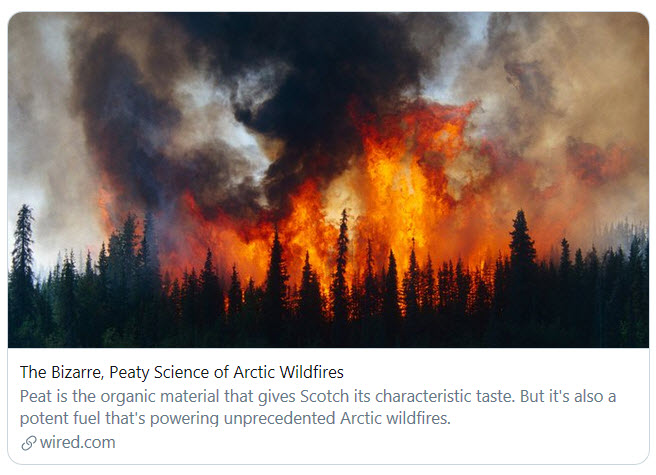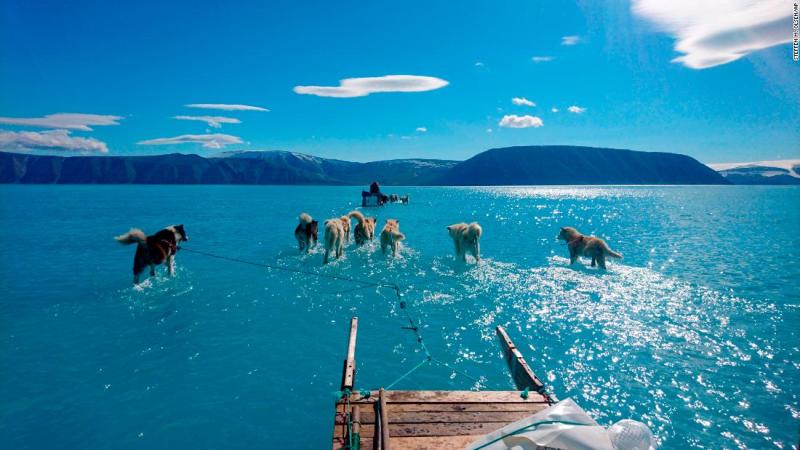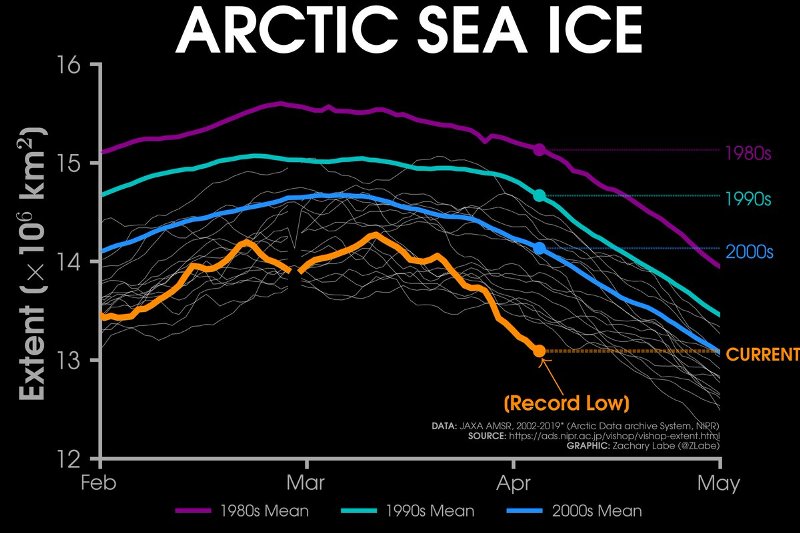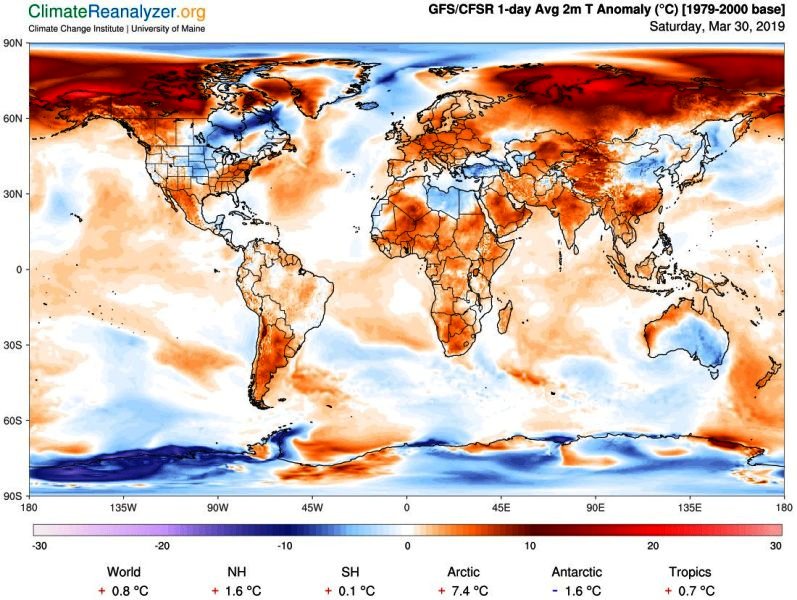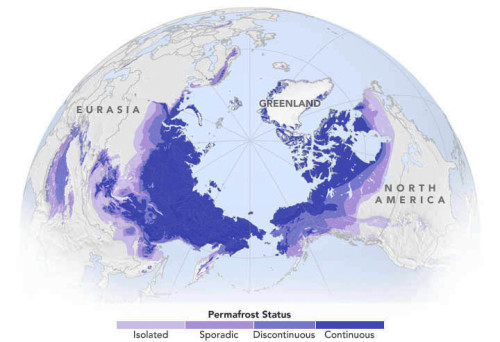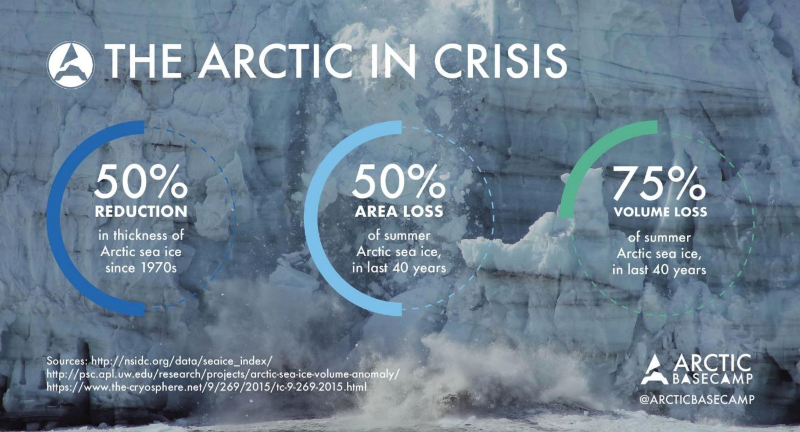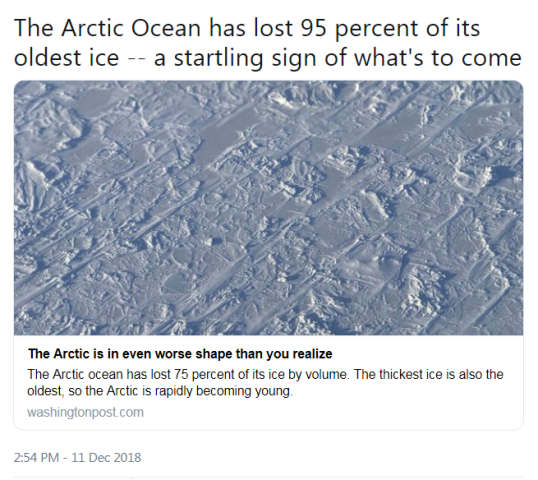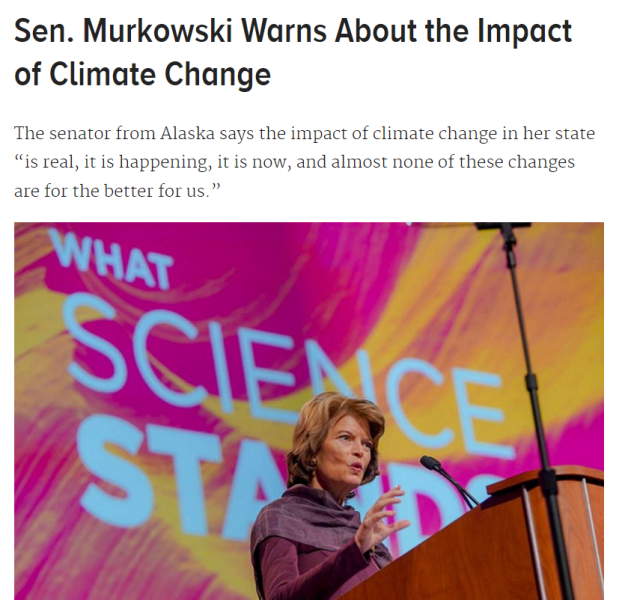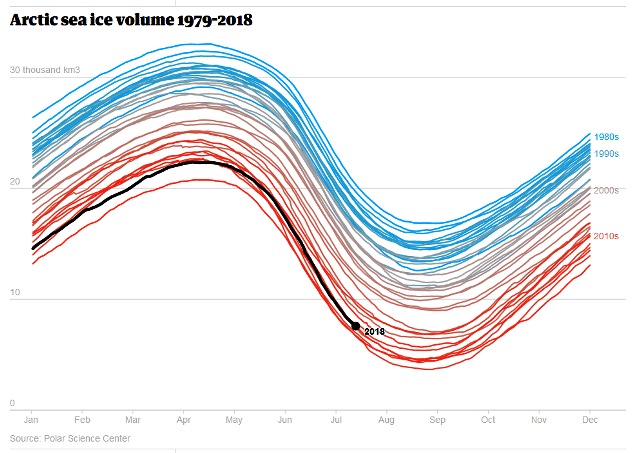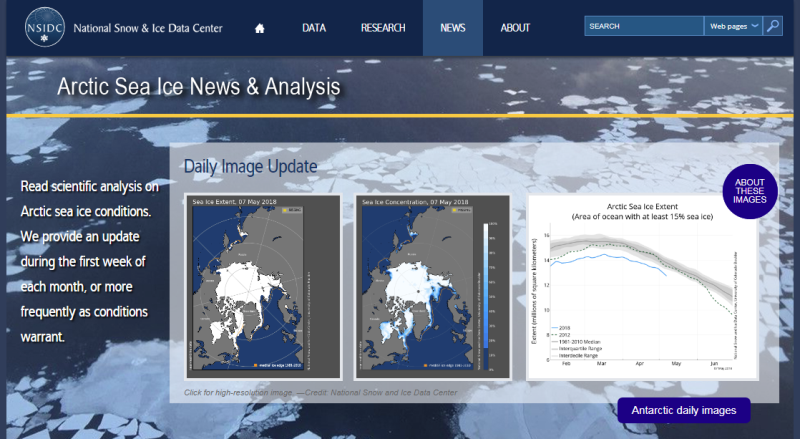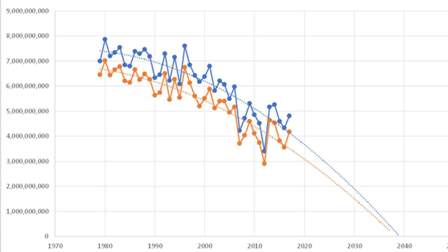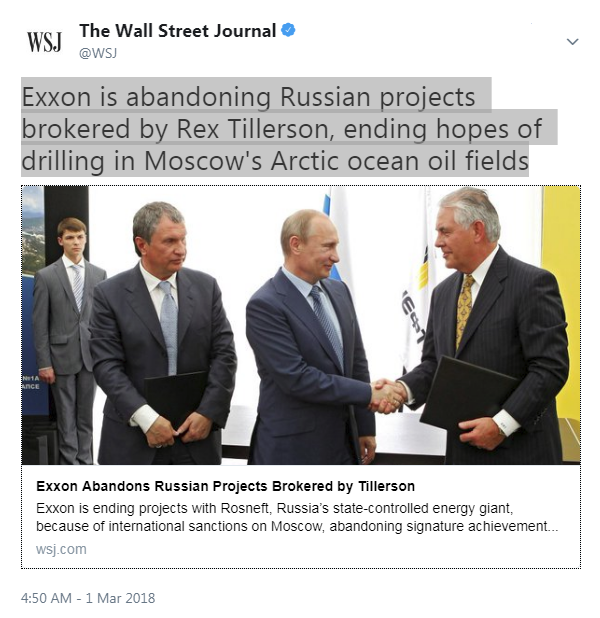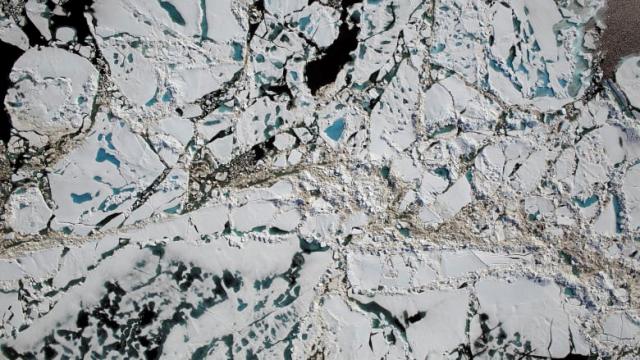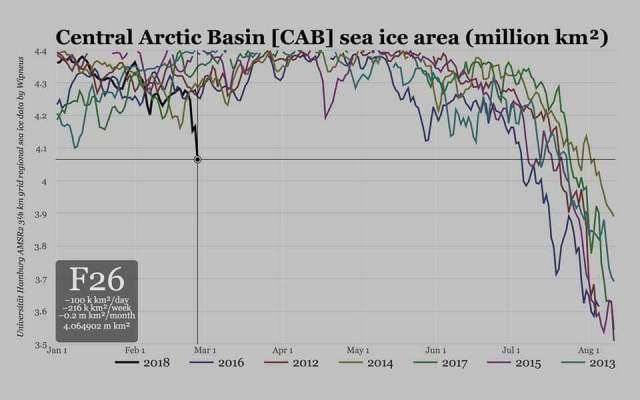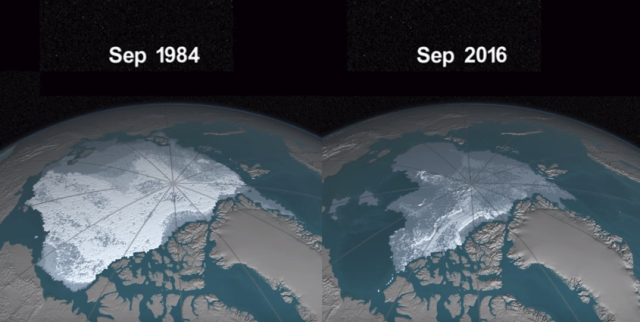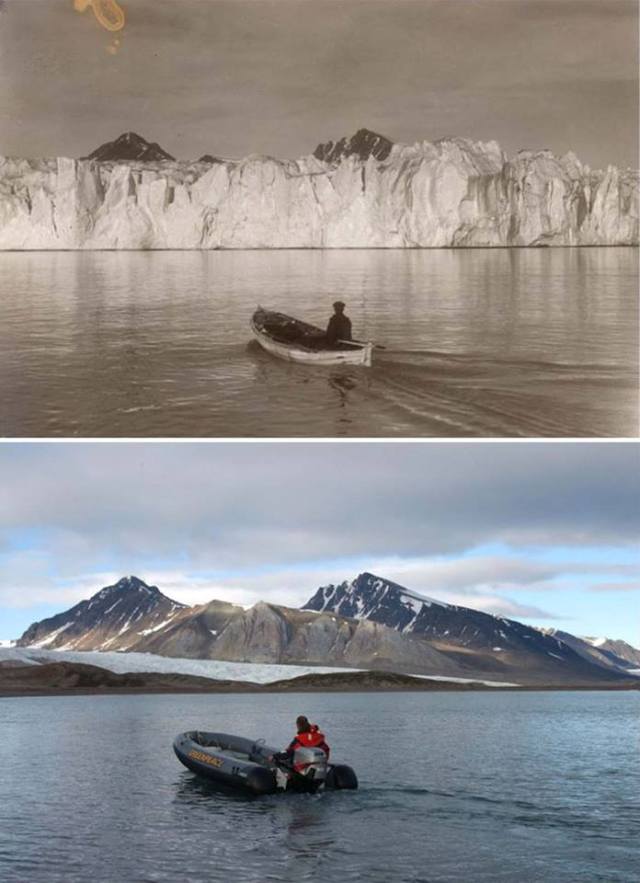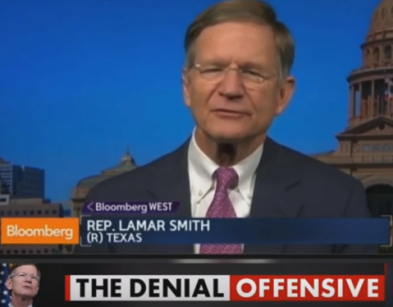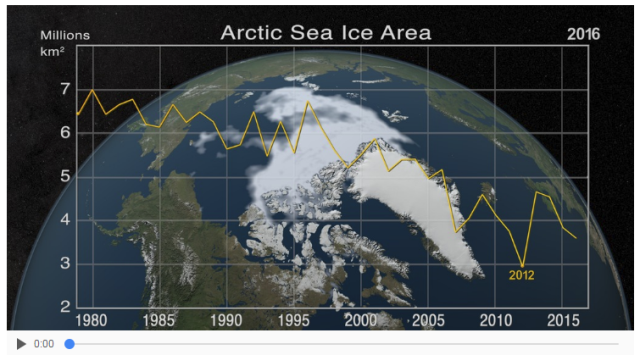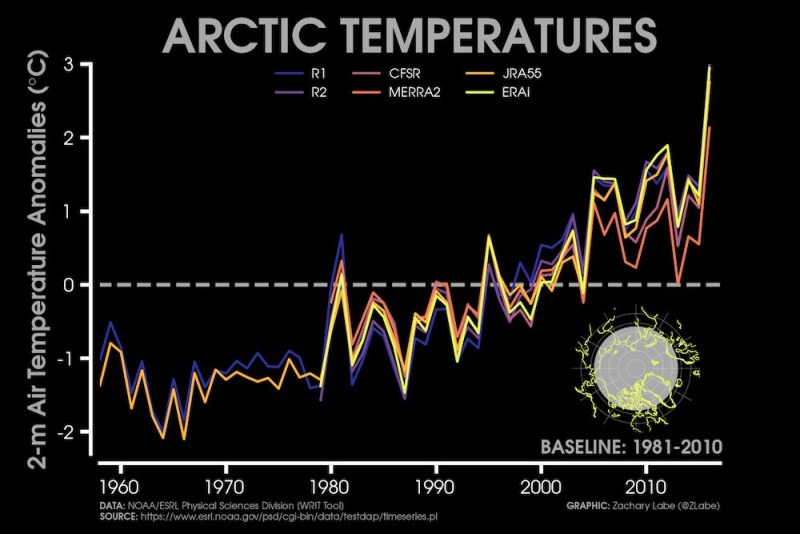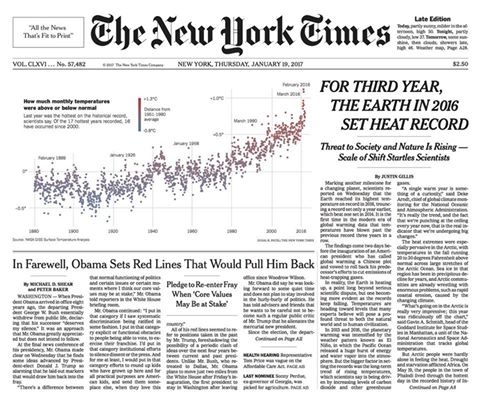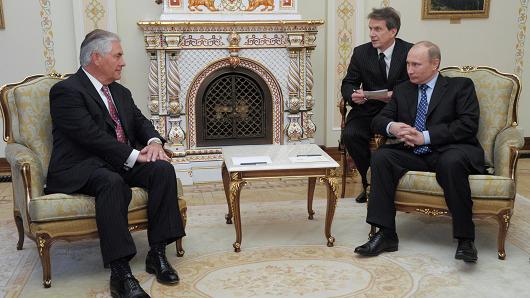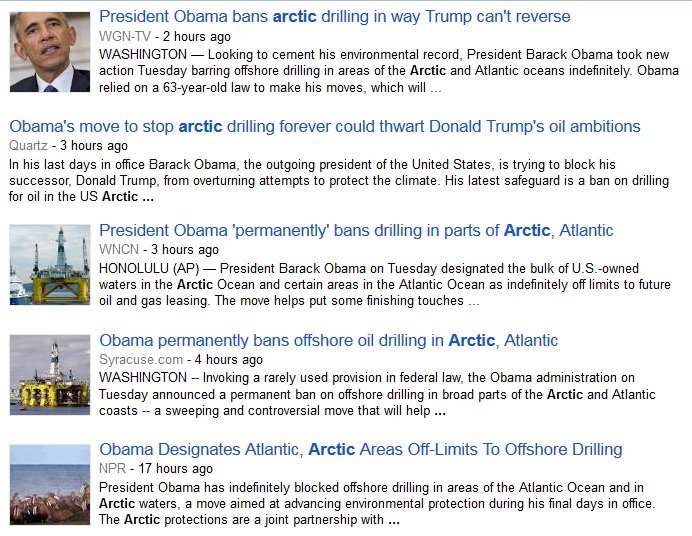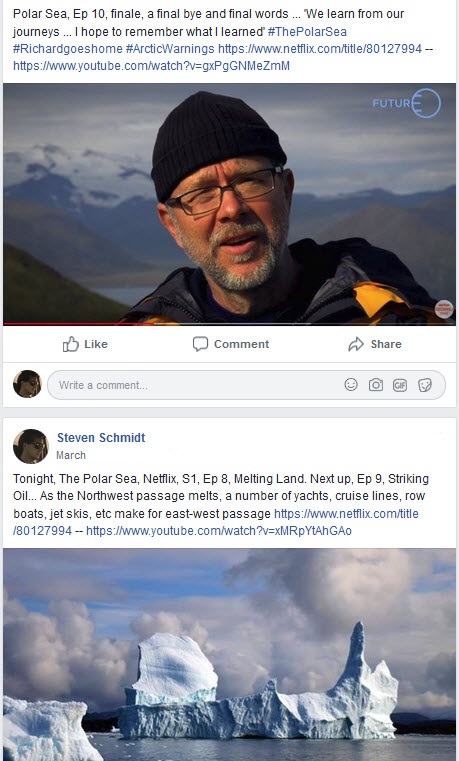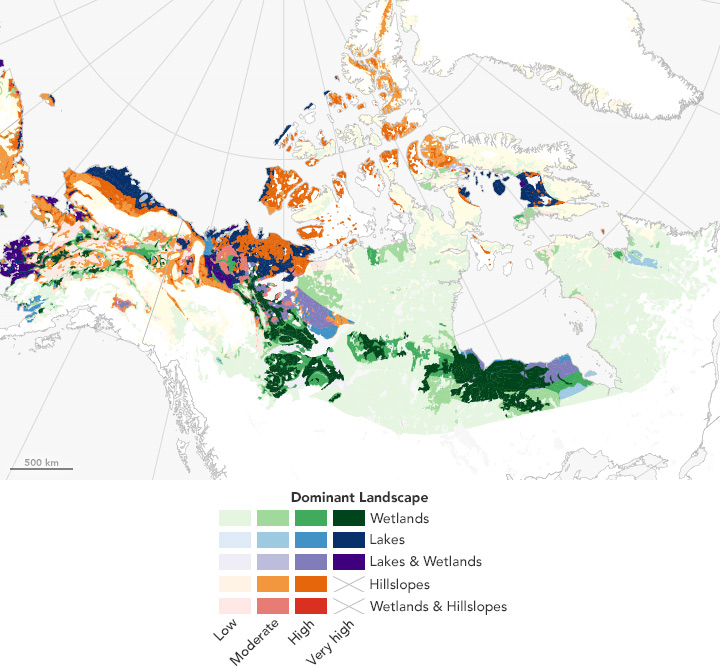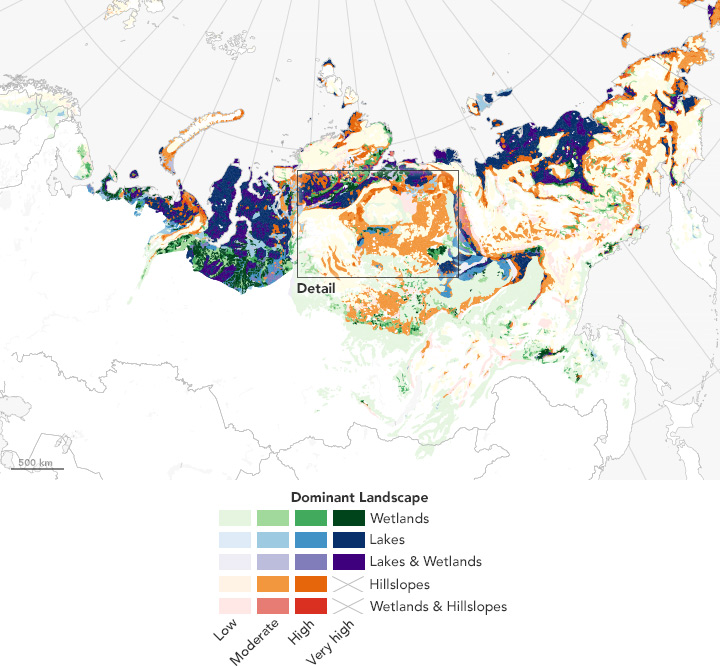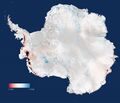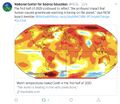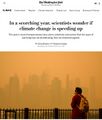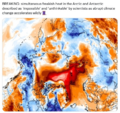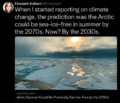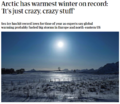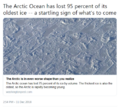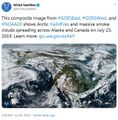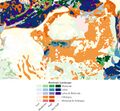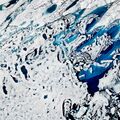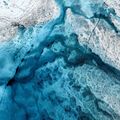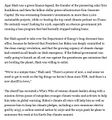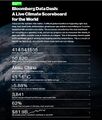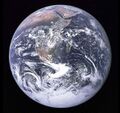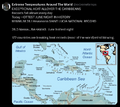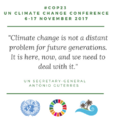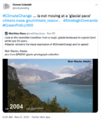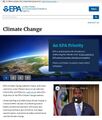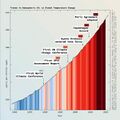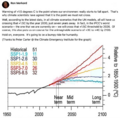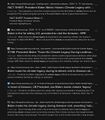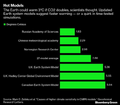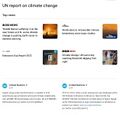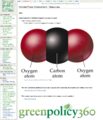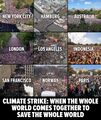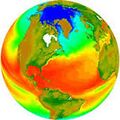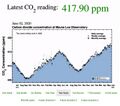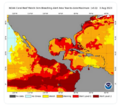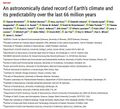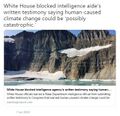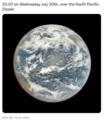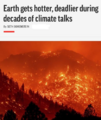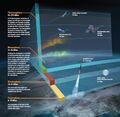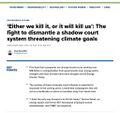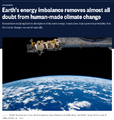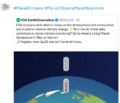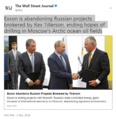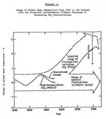Category:Arctic
GreenPolicy360 Arctic Watch
- What happens in the North doesn't stay in the North
- ·····························································
Follow the MOSAIC Expedition into the Arctic
September 2020
A Farewell to Arctic Ice
Need New Ice Sheet Melt Worst Case Scenario
August 2020
Greenland's ice sheet lost an annual record of 532 billion tons of ice, with 223 billion tons of ice lost during the month of July alone.
To put that in comparison, between 2003 and 2016 the ice sheet lost about 255 billion tons of ice on average -- per year.
"We have documented another record loss year for Greenland," said Ingo Sasgen, a glaciologist at the Alfred Wegener Institute for Polar and Marine Research and co-author of the study.
"What this shows is that the ice sheet is not only out of balance but it's increasingly likely to produce more and more extreme loss years."
The report follows another study published last week that found Greenland's ice sheet has melted to a point of no return, and is retreating in rapid bursts, leading to a sudden and unpredictable rise in sea levels.
In Memory of Planet Citizen Konrad Steffen
Renowned climate scientist dies in Greenland ice sheet accident
In 2017, Konrad Steffen talks about the Polar Research Station, climate change and the Greenland landscape
The Tipping Point in Greenland, Past the Point of No Return
Tipping Point Reached 20 Years Ago
New study warns: We have underestimated pace at which the Arctic is melting
Temperatures in the Arctic Ocean between Canada, Russia and Europe are warming faster than researchers' climate models have been able to predict.
Over the past 40 years, temperatures have risen by one degree every decade, and even more so over the Barents Sea and around Norway's Svalbard archipelago, where they have increased by 1.5 degrees per decade throughout the period.
This is the conclusion of a new study published in Nature Climate Change.
"Our analyses of Arctic Ocean conditions demonstrate that we have been clearly underestimating the rate of temperature increases in the atmosphere nearest to the sea level, which has ultimately caused sea ice to disappear faster than we had anticipated," explains Jens Hesselbjerg Christensen, a professor at the University of Copenhagen's Niels Bohr Institutet (NBI) and one of the study's researchers.
July 2020
'Another Bites the Dust'
Scientists from the National Snow and Ice Data Centre (NSIDC) at the University of Colorado Boulder initially predicted the disappearance of the St. Patrick Bay ice caps would take place over five years, but it's actually only taken three.
The frozen sheets, probably in place for several centuries, measured more than 10 square kilometres (3.86 square miles) combined at the end of the 1950s, and have now shrunk down to nothing. It's a sign of the climate change that's gaining momentum all around the world, and showing no signs of stopping.
Take the Ice-free Northern Route
····················································································
Russian whistleblower risking it all to expose the scale of the disaster. Environmentalists calling it the worst ecological catastrophe in the polar Arctic.
····················································································
Arctic warming? "More like three times the global mean." -- Dr. Gavin Schmidt
- Gavin Schmidt (@ClimateOfGavin) | https://twitter.com/ClimateOfGavin
June 2020
A Disastrous Summer in the Arctic
Weather Report: Siberia is Hot, Really Hot
Alarming heat scorched Siberia on Saturday (June 20, 2020) as the small town of Verkhoyansk (67.5°N latitude) reached 100.4 degrees Fahrenheit, 32 degrees above the normal high temperature... this is likely the hottest temperature ever recorded in Siberia and also the hottest temperature ever recorded north of the Arctic Circle, which begins at 66.5°N.
Greenland: 'Yuge Changes' in 'Human Time'
'New Arctic': Wildlife Migrations & Shifting Patterns as the Arctic Warms
- Arctic / 'New North' Photo Essay
May 2020
Earlier this week in Siberia up to 86 degrees F. (30.1 C.)
The Arctic is ... 'Freakishly Warm'
The Arctic has been on one recently. Russia had its hottest winter ever recorded, driven largely by Siberian heat. That heat hasn’t let up as the calendar turns to spring. In fact, it’s intensified and spread across the Arctic. Last month was the hottest April on record for the globe, driven by high Arctic temperatures that averaged an astounding 9.4 degrees Celsius above normal, according to NASA data...
Large parts of Russia were anywhere from 6 to 8 degrees Celsius hotter than normal, according to data kept by Russia’s weather service. That smashes the previous record set in the winter of 2015-16 by 1.3 degrees Celsius. Amid the widespread heat were major records in places like Moscow, which barely got a winter at all this year.
························
April 2020
Shell Abandons Arctic Drilling Agreement with Russia
March 2020
Oil/Gas Stock Prices Continue to Plunge
Fossil Fuels Demand Continues Its Historic Fall
Gasoline Demand Falls Most Ever
This could go even lower': Oil prices plunge to 17-year lows as demand drop threatens to overwhelm storage facilities
Crude oil prices tanked as continued fears over the coronavirus pandemic slammed energy demand.
February 2020
BP 'Reimagining Energy' ... Our purpose is reimagining energy for people and our planet. We want to help the world reach net zero and improve people’s lives.
- We will aim to dramatically reduce carbon in our operations and in our production, and grow new low carbon businesses, products and services.
- We will advocate for fundamental and rapid progress towards Paris and strive to be a leader in transparency.
- We know we don’t have all the answers and will listen and work with others.
- We want to be an energy company with purpose; one that is trusted by society, valued by shareholders and motivating for everyone who works at BP.
- We believe we have the experience and expertise, the relationships and the reach, the skill and the will, to do this.
This will mean tackling around 415 million tonnes of emissions – 55 million from our operations and 360 million tonnes from the carbon content of our upstream oil and gas production. Importantly these are absolute reductions, to net zero, which is what the world needs most of all. We are also aiming to cut the carbon intensity of the products we sell by 50% by 2050 or sooner.
The world’s carbon budget is finite and running out fast; we need a rapid transition to net zero. -- Bernard Looney, chief executive officer
January 2020
'Thermokarst'
Permafrost Is Thawing So Fast, It’s Gouging Holes in the Arctic
Normally, these terrains of frozen soil thaw gradually. But in some places, it’s thawing so abruptly that landscapes are collapsing in on themselves
Via Nature Geoscience
December 2019
2019 Arctic Report Card
The average annual land surface air temperature north of 60° N for October 2018-August 2019 was the second warmest since 1900. The warming air temperatures are driving changes in the Arctic environment that affect ecosystems and communities on a regional and global scale.
The Greenland Ice Sheet is losing nearly 267 billion metric tons of ice per year and contributing to global sea-level rise.
Greenland ice sheet loss at 'worst-case' scenario
North American Arctic snow cover in May 2019 was the fifth lowest in 53 years of record. June snow cover was the third lowest.
Tundra greening continues to increase in the Arctic, particularly on the North Slope of Alaska, mainland Canada, and the Russian Far East.
Trump: It's a Hoax
The North Polar Region has warmed almost as much in the last decade as the whole of the Earth in the last 137 years, according to a new study.
The research paper claims the Arctic has warmed by 1.35°F (0.75°C) in 10 years, while Earth as a whole has warmed by around 1.44°F (0.8°C) since the start of the 1880s.
The new research paper, written by 15 international experts, predicts the effects of a 3.6°F (2°C) average global temperature rise – a milestone anticipated in the Paris Agreement.
'Many of the changes over the past decade are so dramatic they make you wonder what the next decade of warming will bring,' said lead author Eric Post, a UC Davis professor of climate change ecology.
'If we haven't already entered a new Arctic, we are certainly on the threshold.'
Fox News: Greenland Ice Sheet Melt Accelerating
Science Advances: Arctic Warming Fast & Faster
November 2019
Then and Now
October 2019
On Thin Ice
The Arctic has been warming twice as fast as the rest of the planet, with higher temperatures pushing sea ice into a loop of melting and thinning. Its extent is lower today than in the ‘80s and ‘90s in “every area, every month and every season”, according to a recent IPCC report, which points out the plunging sea ice levels of September are probably unseen in at least 1,000 years. The same report points out that the Arctic’s sea ice melt season has grown as ice melts earlier and waters freeze later in the year. “We'll have winter sea ice for a long time to come, but unless actions are quickly taken, the summer sea ice might be essentially gone only a few decades from now,” says Dr. Mark Serreze, director of the National Snow and Ice Data Center (NSIDC).
···································
Trump: There's not a climate crisis.
Trump on the Arctic melting, it's an opportunity. It's time to speed up gas and oil drilling in the Arctic and globally.
···································
What happens in the Arctic doesn't stay in the Arctic
Beauty & Peril in Greenland
- Read the PBS story of the melt
September 2019
Climate Crisis, Law of the Sea, the Arctic Five, the Arctic Council, and the 'Pompeo Doctrine'
Oil, Gas, Minerals & Mining in a Melting Arctic
August 2019
Breaking Records, Melting in Greenland
Greenland & the Arctic is "where the action is" (Video)
Helluva Summer: "Alaska Waters Ice Free"
Glaciers of Iceland: Going, Going, and Gone
········································
A heatwave in Greenland is producing record highs across the ice sheet, including at East Grip, the second highest monitoring station. “If you start melting at the top of the ice sheet, we are going to lose [the] Greenland ice sheet long-term."
At the summit of the Greenland ice cap the temperature rarely rises above zero degrees centigrade — the elevation is 3,200m and the ice below is more than a mile thick.
But last Friday (Aug 2, 2019), as the sun beat down, a small weather station laden with sensors captured something highly unusual: the temperature crept past zero and up to 3.6C — the highest since records began three decades ago. As temperatures rose across the massive ice sheet, which blankets an area five times the size of Germany, around 60 per cent of the surface started to melt, one of the largest ever recorded.
Scientists know of only three prior occasions in the past 800 years when there has been melting at the very top of the ice cap, which is kept chilled by the large volume of ice beneath. But this seems to be getting more frequent — it is now the second time this decade it has happened.
July 2019
Believe it or not, Arctic Wildfires
Historic heat wave in Greenland... and historic fires in the Arctic
The Arctic is on fire, but it's just not trees that are burning, it's peatlands. The problem is supremely urgent.
“(Y)ou can burn well over 1,000 years of carbon accumulation in one single fire.”
June 2019
Temperatures 40 degrees above normal, Arctic Ocean and Greenland ice sheet see record June melting
May 2019
Via DoD / U.S. Pompeo warns of "aggressive behavior" in the Arctic region
Via Eyes on the Arctic / Pompeo lashes out at China, Russia
Via Union of Concerned Scientists / Trump administration: Arctic warming is good
April 2019
Key indicators of Arctic climate change: 1971–2017
• https://iopscience.iop.org/article/10.1088/1748-9326/aafc1b/meta
• https://iopscience.iop.org/journal/1748-9326/page/Arctic-Environmental-Variability-Change
March 2019
Anchorage Daily News / Where's the Ice?
Sea ice is again at a historic low in the Bering Sea.
At the time of year when ice usually reaches its maximum, there’s open water in a vast area stretching from Bristol Bay to the Bering Strait, said Rick Thoman, a climate specialist with Alaska Center for Climate Assessment and Policy at the University of Alaska Fairbanks.
“You could take your sailboat and sail from Dillingham all the way to Little Diomede and never see much more than an ice cube,” he said.
In the middle of Bering Strait, the ice went out on Thursday, leaving nothing but water...
March and early April are typically when sea ice in the Bering Sea reaches its maximum extent, and when communities that live along the coast travel on the ice for subsistence hunting and fishing.
The unprecedented lack of ice in the Bering Sea follows another record-breaking winter. Last spring, in 2018, the extent of ice in the Bering Sea only reached half of its previous lowest size, which was recorded in 2001. Thoman called the lack of ice “stunning” at the time.
This spring, the situation is even more extreme. While there’s more ice on the Russian side of the Bering Sea, there’s virtually none on the Alaska side.
Arctic Undergoing Most Unprecedented Transition in Human History
China, Russia, the Arctic, and Military Positioning
December 2018
November 2018
Climate Impact Far Beyond the Arctic
October 2018
NASA Video / 2018 Arctic Sea Ice Ties for Sixth Lowest Minimum Extent on NASA Record
First Container Ship Crosses the Arctic
Melting Arctic ice lets world's biggest shipping firm complete first voyage through previously impenetrable Northeast Passage
- Maersk sent a new ship across the polar sea for the first time
- The route has historically been difficult to traverse because of thick sea ice
- Global warming has melted much of the route, opening it up to trade ships
The Northern Sea Route could be a shorter route for journeys from East Asia to Europe than the Northwest Passage over Canada because it will likely be free of ice sooner due to climate change.
The container vessel, Venta Maersk, traveled from Vladivostok to St Petersburg over the northern top of Russia.
Experts say the new passage reduces the most commonly used East Asia-Europe route via the Suez Canal from 13,000 miles (21,000 kilometres) to 8,000 miles (12,800 kilometres), cutting transit time by 10-15 days.
Typically vessels taking this icy route have required an ice-breaker escort, but rising global temperatures are making the passage easier to traverse.
The Northern Sea Route is becoming appealing to the shipping industry, especially to the oil and gas sector, as it is much shorter than the Suez Canal.
The reduction of ice in the Arctic and design of new ice-breaking commercial vessels make the transportation of abundant Arctic natural energy resources commercially viable.
- By Kieran Mulvaney / Washington Post Magazine
September / August 2018
Via The oldest and thickest sea ice in the Arctic has started to break up, opening waters north of Greenland that are normally frozen, even in summer.
This phenomenon – which has never been recorded before – has occurred twice this year due to warm winds and a climate-change driven heatwave in the northern hemisphere.
One meteorologist described the loss of ice as “scary”. Others said it could force scientists to revise their theories about which part of the Arctic will withstand warming the longest.
The sea off the north coast of Greenland is normally so frozen that it was referred to, until recently, as “the last ice area” because it was assumed that this would be the final northern holdout against the melting effects of a hotter planet...
July / June / May 2018
Peruse scientifically ...
- Arctic Sea-ice retreat
- Short-, Mid-, Long-term
- A review, the ongoing loss of Arctic sea ice across all seasons is examined, including data sets over time based on satellite retrievals, atmospheric reanalysis, climate-model simulations and earth science reporting.
- National Academy of Sciences / Reporting that “[s]ince the satellite record began in 1978 … the yearly minimum Arctic sea ice extent (which occurs in early to mid-September) has decreased by more than 40% ... Leveraging scientific credibility about Arctic sea ice trends in a polarized political environment.
April 2018
What Extremely Warm Winters Mean for the Future of the Arctic
In an interview with Yale Environment 360, polar scientist Mark Serreze talks about the rapid changes he has witnessed over more than three decades of working in the Arctic and the future stability of the region if temperatures continue to climb.
- We’re going to have an Arctic that, except for winter, you look at it from satellite and it’s going to be a blue ocean. It will have lost its ice. Not just its sea ice, but a lot of the permafrost will be thawed, the snow cover season will be much shorter. The thing is, when you’re thinking about the Arctic, the Arctic’s soul is its ice. When you lose that ice, the Arctic loses its soul.
March 2018
"It was bigger than sending a man to the moon" -- Russia-US drilling in a Warming Arctic (2011)
- The big story, the 'follow the money' story, the story of oil/gas profits and global environmental costs
- Rosneft/Exxon's $500 billion deal, Rex Tillerson appointment as US Secretary of State, political-economic reality
Exxon is abandoning Russian projects
Via the Wall Street Journal -- Exxon-Russian Plans for drilling in Arctic ocean oil fields end -- temporarily.
- Withdrawal from joint venture brokered by Tillerson for now marks end of energy giant’s hopes of drilling in Arctic ocean oil fields
The Texas oil giant said in a regulatory filing late Wednesday that it would walk away from the joint venture with state-controlled PAO Rosneft to seek oil in the ice-choked waters of the Kara Sea, a hard-fought deal signed in 2012 by the company’s former chief executive, Rex Tillerson, now U.S. secretary of state.
Mr. Tillerson had touted the agreement as a breakthrough giving Exxon access to one of the world’s great unexplored oil and gas basins. The company reportedly spent about $700 million to drill the first well, likely making it the most expensive ever. It struck oil, according to Rosneft...
Exxon declined to comment on the reasons for its decision. The company said it would formally begin to withdraw from the Rosneft joint ventures this year, taking a $200 million loss after taxes.
Rosneft said in a statement carried by Russian news agencies that it would support the return of Exxon to the projects in the future if it were legally possible.
Via Medium / "Follow the Money from the Rosneft/Exxon $500 billion deal"
- Igor Sechin described the ambition of the (2011 announced) Rosneft/Exxon project as “bigger than sending man to outer space or flying to the moon.”
- “Experts say that this project, in terms of its ambitions, exceeds sending man into outer space or flying to the moon,” Russian Deputy Prime Minister Igor Sechin, an architect of the partnership, told a briefing for analysts in New York.
···························
February 2018
How's the Weather?
https://www.greenpolicy360.net/w/File:Arctic_ice_Sep_1984_-_Sep_2016_vid.png
Watch the Arctic Sea Ice seasonally shrink in this NASA time-lapse vid
·····················································
Arctic temperatures are soaring
by Joe Romm
It was the warmest December on record in the Arctic, and 2018 has already set a string of records for lowest Arctic sea ice.
Unfortunately for America and the rest of the planet, the best science makes clear that what happens in the Arctic doesn’t stay in the Arctic. “We long ago anticipated that warming would be greatest in the Arctic owing to the vicious cycle of melting ice and warming oceans,” climate scientist Mike Mann told ThinkProgress via email.
“But what we didn’t anticipate is the way that changing wind patterns could accelerate that process — and along with it, a host of nasty associated surprises.”
Surprises include “including slowing down of ocean currents, and whacky weather patterns in North America associated with weather extremes like droughts, wildfires, floods, and superstorms.”
And those are in addition to the “nasty” associated impacts that scientists have long predicted would result from Arctic warming, such as faster melting of the land-based Greenland ice sheet, which in turn drives the speed up in sea level rise that scientists reported last week (Feb. 12, 2018)....
- John Abraham, professor of thermal sciences: “The temperatures in the Arctic are off the chart. This matters for the rest of us because this is the time of year when the Arctic ice should be growing. But it isn’t growing like it should. So, this summer, there will be less ice and more open waters that will lead to more warming. We've started a feedback loop that we cannot stop.”
○
January 2018
National Geographic / Pictures show Climate Change's dramatic Arctic impact
A photographer’s work with Greenpeace has given him a front-row seat to twenty years of drastic change
○
December 2017
Ghosts of the Arctic (Vimeo/HD)
The Northwest Passage Opens: The Future of Ice-Free Arctic Commercialization Comes into View
The Arctic as we once knew it is no more
Scientists Thought an Alaskan Weather Station Was Broken...
It Was Just Climate Change
November/October 2017
As the Ice Retreats -- Oil/Gas Pressures in the North Accelerate
New Risks and Volatile Change
Listen to the serving Commandant of the US Coast Guard:
- Adm. Paul Zukunft, U.S. Coast Guard commandant / July 25, 2017: (WGBH Boston / National Public Radio Interview)
- ~ Arctic Militarization?
- ~ Surface ships in the Arctic, the US/Russian future on oil/gas resources...
- ~ The US is only Arctic nation that has not ratified the Convention of the Law of the Sea
- ~ EEZs / Exclusive Economic Zones / Off-shore extended continent shelf -- https://en.wikipedia.org/wiki/Exclusive_economic_zone
- ~ Territorial Waters -- https://en.wikipedia.org/wiki/Territorial_waters
September / August 2017
> Russian tanker sails through Arctic without icebreaker for first time
Trump 'Reluctantly' Signs Sanctions Bill, US/Russia Arctic Gas/Oil Ventures Blocked
July / June 2017
Time to Drill?
Trump: Time to Open the Arctic to Drilling
US Senate Passes Russia Sanctions Deal
- In effect, action by the US Congress to continue/extend sanctions has the effect of blocking ExxonMobile-Rosneft Arctic drilling
- Exxon and Rosneft offshore exploration partnership plans to invest as much as $500 billion in developing Russia's vast energy reserves in the Arctic and Black seas
Head of the US House Committee on Science: Climate Change is "Beneficial"
Lamar Smith's New Line: It's time to Celebrate
WASHINGTON / HuffPost / July 24, 2017 — Rep. Lamar Smith (R-Texas) — who has spent his career cozying up to fossil fuel interests, dismissing the threat of climate change and harassing federal climate scientists — is now arguing that pumping the atmosphere full of carbon dioxide is “beneficial” to global trade, crop production and the lushness of the planet.
Rather than buying into “hysteria,” Americans should be celebrating the plus sides of a changing climate, Smith argues in an op-ed published July 24th in The Daily Signal, a news website published by the conservative Heritage Foundation.
································································································
June 8 / DC Law Firm's Russian Clients and New Presidential FBI Appointee
Exxon-Rosnoft, Tillerson-Putin, and a Sanctions Timeline from the Business Insider
··························································································
“Roast the Arctic and you create a mess everywhere on Earth...”
- -- Princeton University climate scientist Michael Oppenheimer
Arctic Could Be Ice Free by 2040
○
May 2017
Why Care About Black Carbon?
Soot / 'Black Carbon' in the Arctic
Rex Tillerson speaks of 'how the Trump administration will approach the issue of climate change'
Tillerson’s appearance in Alaska at the Arctic Council Ministerial Meeting comes two days after the White House said Trump would postpone a decision over whether to pull out of the landmark Paris climate accord until after he meets world leaders at the Group of Seven summit later this month.
“We are currently reviewing several important policies, including how the Trump administration will approach the issue of climate change,” Tillerson said Thursday during his remarks to the Arctic Council, which also includes Finland, Denmark, Iceland, Norway, and Sweden. “We’re going to work to make the right decision for the United States.”
Tillerson called for vigilance in protecting the Arctic’s “fragile environment.” The U.S. will continue to be an active member of the council," he said. “The Arctic region has been facing unprecedented change and challenges.”
Initially (in their joint "Fairbanks Declaration" statement that accompanied the Council's meeting,) the U.S. objected to references to climate change, renewable energy and United Nations sustainability goals in an early draft of the joint statement, said Rene Soderman, senior adviser for Arctic cooperation at the Ministry of Foreign Affairs of Finland. The council reworked the wording and convinced the U.S. to accept the changes.
“We were able to push the U.S. back as much as possible,” Soderman said.
Dollars & the Arctic
Snow, Water, Ice and Permafrost in the Arctic: Summary for Policy-makers
The Arctic Transformed
The Arctic is warming faster than any other region on Earth. Over the past 50 years, the Arctic’s temperature has risen by more than twice the global average.
The Arctic Council is the leading intergovernmental forum promoting cooperation, coordination, and interaction among the Arctic States, Arctic indigenous peoples, and other Arctic inhabitants on common Arctic issues, in particular on issues of environmental protection and sustainable development in the Arctic. Established in 1996, the Arctic Council is composed of eight Member States (Canada, the Kingdom of Denmark, Finland, Iceland, Norway, the Russian Federation, Sweden, and the United States). It also includes six organizations representing Arctic indigenous peoples.
○
April 2017
- Pushed by Currents, Billions of Pieces of Plastic Pollution from World's Oceans End Up in the Arctic
March 2017
On a tour on the Franz Josef Land archipelago, a sprawling collection of islands where the Russian military has recently built a new runway and worked to open a permanent base, Putin emphasised on Wednesday (March 29) the need to protect Russia's economic and security interests in the Arctic.
"Natural resources, which are of paramount importance for the Russian economy, are concentrated in this region," Putin said in remarks carried by Russian news agencies.
Putin said current estimates put the value of the Arctic's mineral riches at $30 trillion.
NASA's Earth Science News Team / Arctic sea ice appears to have reached on March 7 a record low wintertime maximum extent, according to scientists at NASA and the NASA-supported National Snow and Ice Data Center (NSIDC) in Boulder, Colorado. And on the opposite side of the planet, on March 3 sea ice around Antarctica hit its lowest extent ever recorded by satellites at the end of summer in the Southern Hemisphere...
○
February 11, 2017 via CS Monitor — Records are shattering left and right across the Arctic, much like the ever-dwindling sea ice that once covered the entire Arctic Ocean.
First, the facts. January sea ice area has never been so small. In November, the coverage fell short of average by an area the size of the eastern half of the United States. Northeast Greenland had its warmest February day ever (by almost four degrees). The current heat wave brought temperatures near the North Pole to 50 degrees above average...
“We’re still trying to figure out what is happening here,” Mark Serreze, a senior research scientist with the Colorado-based Snow and Ice Data Center that compiles and reports the history of Arctic ice conditions.
“The ridiculously warm temperatures in the Arctic during October and November this year are off the charts over our 68 years of measurements,” Jennifer Francis, a climate scientist at Rutgers University...
Everyone agrees that "something is very, very wrong with the Arctic climate"...
“[A]fter studying the Arctic and its climate for three and a half decades, I have concluded that what has happened over the last year goes beyond even the extreme,” wrote Mark Serreze, director of the National Snow and Ice Data Center in Boulder, Colo., in an "Crazy times in the Arctic" article for Earth magazine.
The number of freezing degree days is far lower than any other period on record.
https://pbs.twimg.com/media/C4Lj3gcWIAE6dqF.jpg
Between 1980 and 2016 the amount of summer ice in cubic kilometers has decreased by an estimated 72 percent...
- January 19, 2017
Northern Routes Open as Ice Retreats
Exxon Mobil could tap huge Arctic assets if US - Russian relations thaw
- Former Exxon CEO and new US Sec of State Rex Tillerson meets with Russian President Putin
- during 2012 negotiations to move forward with joint oil/gas ventures described as historic
○ ○ ○ ○ ○ ○ ○ ○ ○
February 2017
Ex-Chief of ExxonMobil Testifies Before US Congress
- President-elect Donald Trump's nominee for Secretary of State, Rex Tillerson, said he believes the risks of climate change "could be serious enough that action should be taken,” but he did not elaborate on what that action should be.
Tillerson testified that he formed his views “over about 20 years as an engineer and a scientist, understanding the evolution of the science.” Ultimately, he said, he concluded that increasing greenhouse-gas concentrations in the atmosphere are having an effect on the earth’s climate. But he added, “Our ability to predict that effect is very limited,” and precisely what actions nations should take “seems to be the largest area of debate existing in the public discourse.”
○
December 2016
Geopolitics in the Arctic
- Russia and the United States are moving with force to claim fossil fuel exploration and production rights
- Canada, China, Norway and additional countries are look to join into the Arctic resource exploration
- A 'gas/oil' resource rush is imminent despite inherent dangers and impacts on global climate
- The critical, strategic demand continues for New Definitions of National and Global Security
- A preliminary assessment by the US Geological Survey suggests the Arctic seabed may hold as much as 25 percent of the world's undiscovered oil and natural gas reserves.
- By one USGS reported estimate, 400 billion barrels of oil might lie beneath the Arctic seabed.
A Final Presidential Decision Re: Arctic Oil/Gas
December 19, 2016 / President Barack Obama prepares to leave office and prepares to block the sale of new offshore drilling rights in most of the U.S. Arctic and parts of the Atlantic. The executive order that could indefinitely restrict oil production there, according to people familiar with the decision.
http://www.foxnews.com/politics/2016/11/18/obama-blocks-new-oil-gas-drilling-in-arctic-ocean.html
Arctic Sea Ice at Record Lows / December 2016
http://phys.org/news/2016-12-state-arcticlonger-seasons-thinning-sea.html
https://insideclimatenews.org/news/13122016/arctic-melting-climate-change-noaa-science
http://earthobservatory.nasa.gov/IOTD/view.php?id=89223
http://www.arctic.noaa.gov/Report-Card
- Not Good News, Arctic Sea Ice News
First Cruise Ship Crossing the Ice-Free Arctic Passage
- http://www.cruiseindustrynews.com/cruise-news/15687-serenity-departs-for-northwest-passage-trip.html
- http://www.ktva.com/shows/frontiers/episode-74-crystal-serenitys-historic-voyage-951/ Arrival (September 16, 2016) in New York City ...
The beginning of cruise ships plying the formerly isolated, ice-bound region... prompting calls for a clamp-down to prevent Titanic-style accidents and the pollution of fragile eco-systems resulting from accidents -- and new gas/oil production.
Arctic nations begin to consider limiting the size of vessels and banning the use of heavy fuel oil in the region after first luxury cruise ship, Crystal Serenity, sailed through the Arctic from Alaska, across Canada's newly navigable Northwest Passage, to New York in the summer of 2016.
Next up, commercial shipping traffic, container ships ...
- http://container-news.com/arctic-ocean-shipping-routes-open-months/
Shipping industry report:
Sea-ice is in a committed, long-term decline as the polar north warms.
This year looks on course to be the second lowest in the satellite record. Researchers do not see this trend being reversed anytime soon.
“If we experience a 2-degree increase in global temperatures, we will get close to an Arctic that is effectively ice-free for part of the year; that’s less than a million sq km of ice cover,” said Reading University's Dr. Ed Hawkins.
“So, even if future emissions are consistent with the Paris agreement, it will of course mean shipping routes will be more open. Not every year, but more regularly than they are now.”
“Open water vessels won’t be hugging the Russian coast quite so much, and ice-strengthened ships will be going right over the pole,” he told BBC News.
Saving time
The incentives are clear: if vessels can transit the Arctic, they will shave many days off their journey times between the Pacific and North Atlantic ports, and save fuel.
In addition, by plotting a more central course, they can avoid the fees they would otherwise be charged for going through Siberian waters.
The team has been looking at how the opportunities might evolve in the decades ahead.
The group used five prominent climate computer models and essentially trained them to better reflect the distribution of Arctic sea-ice as seen in current observations.
They then ran those models forward through the century under different emissions scenarios, to gauge where and how frequently shipping routes would become navigable.
"The Northwest Passage"
2015
- http://www.reuters.com/article/us-sanctions-russia-arctic-shipping-idUSKBN0KV17520150122
2014/2013
- http://www.reuters.com/article/us-climate-arctic-shipping-idUSBRE92718420130308
2012/2011
- http://www.reuters.com/article/us-exxon-rosneft-idUSBRE83H0UE20120418
Oil major ExxonMobil (XOM.N) and Russia's Rosneft ROSN.M unveiled an offshore exploration partnership on Wednesday that could invest upward of $500 billion in developing Russia's vast energy reserves in the Arctic and Black Sea.
The deal, between the world's largest listed oil firm and the world's top oil producing nation, was the product of nearly a year of talks and came about despite a history of mutual distrust between Washington and Moscow dating back to the Cold War and recent difficulties for other Western firms in Russia.
"Experts say that this project, in terms of its ambitions, exceeds sending man into outer space or flying to the moon," Russian Deputy Prime Minister Igor Sechin, a key architect of the partnership, told a briefing for analysts in New York.
Under the deal, signed in Moscow on Monday, Exxon and state-controlled Rosneft will seek to develop three fields in the Arctic with recoverable hydrocarbon reserves estimated at 85 billion barrels in oil-equivalent terms.
A final investment decision on the projects in the Kara Sea, in the centre of Russia's north coast, is expected in 2016-17, Rosneft said in a video presentation at the event, which was hosted by Exxon CEO Rex Tillerson and Rosneft President Eduard Khudainatov.
- https://www.theguardian.com/world/2011/jul/06/us-russia-political-tensions-arctic
- https://www.theguardian.com/environment/2011/oct/05/melting-arctic-ice-supertankers
The Arctic & Geopolitics
Multiplying Global Risks
NYT / October 2005 / Revkin et al. / As Polar Ice Turns to Water, Dreams of Treasure Abound
All told, one quarter of the world's undiscovered oil and gas resources lies in the Arctic, according to the United States Geological Survey...
Geopolitical Issues (a new "Great Game" via GreenPolicy's associated site, Strategic Demands)
Whole Earth / Planet Citizens
- "It's All Connected"
····················································································
○
Subcategories
This category has the following 4 subcategories, out of 4 total.
C
E
G
S
Pages in category "Arctic"
The following 44 pages are in this category, out of 44 total.
C
E
G
- Glasgow Climate Summit - Pledges, Promises, Declarations - What's Next Up
- Global Climate Action Summit
- Green Stories of the Day
- Green Stories of the Day - GreenPolicy360 Archive
- GreenPolicy360 Archive Highlights 2013
- GreenPolicy360 Archive Highlights 2014
- GreenPolicy360 Archive Highlights 2015
- GreenPolicy360 Archive Highlights 2016
- GreenPolicy360 Archive Highlights 2017
- GreenPolicy360 Archive Highlights 2018
- GreenPolicy360 Archive Highlights 2019
- GreenPolicy360 Archive Highlights 2020
- GreenPolicy360 Archive Highlights 2023
P
T
Media in category "Arctic"
The following 200 files are in this category, out of 470 total.
(previous page) (next page)- 2020 record temperatures.png 800 × 502; 358 KB
- 5 19 14 andrew antarcticaelevationchanges-640x547.jpg 640 × 547; 59 KB
- 7-20-2020 GreenPolicy360 RT No.2.jpg 591 × 510; 125 KB
- A Planet Citizen View.png 799 × 1,241; 1.64 MB
- A scorching year, what about the 360 warming data.jpg 600 × 706; 106 KB
- Acceptance on behalf of the United States of America.png 448 × 306; 62 KB
- Act now for a livable future.png 501 × 275; 272 KB
- Ag production and GHG emissions.jpg 680 × 510; 33 KB
- Against the Tide - Cover - by Cornelia Dean.jpg 308 × 475; 57 KB
- Air pollution moves globally.png 620 × 412; 256 KB
- Amazon fires burn across the rainforest.jpg 800 × 504; 76 KB
- Andrew Wheeler confirmed to head EPA.jpg 753 × 600; 85 KB
- Arctic - Antarctic - Breaking.png 639 × 600; 903 KB
- Arctic - Kolbert - 2023.png 553 × 476; 274 KB
- Arctic 2018, It's only the weather.png 631 × 547; 324 KB
- Arctic 30.1 C at 62.5 N.jpg 800 × 432; 80 KB
- Arctic annual average temp 1981-2010.jpg 800 × 534; 76 KB
- Arctic CAB sea ice monitor-Feb 2018 update (2013-2018).jpg 640 × 400; 28 KB
- Arctic heat in Russia-Siberia 2020.gif 784 × 408; 3.6 MB
- Arctic ice Sep 1984 - Sep 2016 vid.png 640 × 322; 308 KB
- Arctic ice trendline.jpg 448 × 252; 10 KB
- Arctic Ice-old ice being lost.png 538 × 480; 388 KB
- Arctic is in Crisis.png 800 × 432; 770 KB
- Arctic Melt - 1950-2020.png 640 × 349; 287 KB
- Arctic Sea Ice - Feb 25, 2018.png 506 × 674; 297 KB
- Arctic Sea Ice 2015.png 1,008 × 756; 542 KB
- Arctic Sea Ice Area graphic thru 2016.png 640 × 355; 382 KB
- Arctic Sea Ice Feb 2018 NASA.jpg 640 × 360; 65 KB
- Arctic sea ice National Geo.jpg 506 × 380; 87 KB
- Arctic sea ice volume 1979-2018.png 640 × 453; 173 KB
- Arctic sea ice watch 25 yrs of ice cover change.png 697 × 386; 314 KB
- Arctic sea ice-April 2019.jpg 800 × 533; 78 KB
- Arctic Siberia Heatwave - Again - June 2021.jpg 640 × 360; 83 KB
- Arctic wildfires-July 2019-NOAA.jpg 640 × 650; 136 KB
- Arctic wildfires-July 2019.jpg 656 × 475; 80 KB
- Arctic-100 yrs difference.jpg 640 × 883; 59 KB
- Arctic-March30,2019.jpg 797 × 600; 126 KB
- Arctic-siberia mdl 1990-2010.jpg 720 × 667; 216 KB
- Arctic-Siberia-6-20-2020.jpg 478 × 644; 148 KB
- Arctic-swipa-spm.pdf ; 4.58 MB
- Arctic1 by Timo Lieber 800x480.jpg 800 × 480; 158 KB
- Arctic2 by Timo Lieber 768x768.jpg 768 × 768; 241 KB
- Arctic3 by Timo Lieber 768x768.jpg 768 × 768; 175 KB
- Arctic4 by Timo Lieber 768x768.jpg 768 × 768; 257 KB
- Arctic6 by Timo Lieber 768x768.jpg 768 × 768; 256 KB
- Arctic7 by Timo Lieber 768x768.jpg 768 × 768; 183 KB
- Arctic8 by Timo Lieber 768x768.jpg 768 × 768; 324 KB
- Atmosphere Science.jpg 800 × 600; 45 KB
- Atmospheric Experiment of Humanity.jpg 519 × 574; 201 KB
- Austin Texas is connected to the Arctic - February 2021.jpg 559 × 619; 163 KB
- Banking - finance - climate - Mann-1.jpg 452 × 640; 162 KB
- Banking - finance - climate - Mann-2.jpg 452 × 640; 164 KB
- Battle for Democracy.jpg 640 × 123; 24 KB
- Biden introduces leadership team - Nov 24 2020.jpg 800 × 644; 173 KB
- Biden selects Kerry as special climate envoy.jpg 592 × 505; 87 KB
- Biden's assembled an all-star climate team 4-21-2021.jpg 682 × 732; 309 KB
- Biden-Sanders Unity Task Force on Climate.jpg 701 × 780; 139 KB
- Big Oil Rocked by News May 27 2021.jpg 639 × 600; 84 KB
- Bill Nelson on Global Temp Rise and Climate Change.png 640 × 353; 100 KB
- Bill Nye The Planet's on Fire.jpg 800 × 675; 106 KB
- Bloomberg Carbon Clock 10-26-2021 8-47-05 AM EST.png 800 × 195; 356 KB
- Bloomberg Live Climate Data Dashboard.jpg 640 × 756; 156 KB
- Blue Marble photo taken by the crew of Apollo 17 (1972).jpg 642 × 605; 129 KB
- Breakpoint - Reckoning with America's Environmental Crisis.jpg 329 × 500; 49 KB
- Bridenstine talks.png 1,485 × 911; 223 KB
- Bucky Trimtab.jpg 348 × 336; 88 KB
- Burst of climate denial as Trump presidency ends.jpg 632 × 604; 92 KB
- Canary - 1.jpg 448 × 901; 144 KB
- Canary - 2.png 446 × 531; 264 KB
- Car heating and cooling.png 465 × 635; 261 KB
- Carbon Brief - Greenhouse gas levels 2021.png 640 × 436; 292 KB
- Caribbean Sea hot - June night 2024.png 676 × 600; 386 KB
- CFSV2 world temp July 3, 2023.png 600 × 800; 513 KB
- CH4 graph - 1980-2020.JPG 640 × 446; 22 KB
- Changes in carbon dioxide per 1000 years - via Climate Central.jpg 682 × 424; 34 KB
- Citizens Climate Lobby - Save Our Future Act 2021.jpg 518 × 262; 77 KB
- Climate Action 25th conf in Madrid.jpg 680 × 510; 22 KB
- Climate activist - Steven Schmidt - 1978 on.png 600 × 480; 174 KB
- Climate Books - 2020.jpg 800 × 450; 69 KB
- Climate Change Conf Nov 6-17.png 464 × 488; 107 KB
- Climate Change COP27 - Nov 11 2022 US Representatives.jpg 712 × 444; 54 KB
- Climate Change COP27 - Nov 11 Kathy Castor.jpg 712 × 710; 77 KB
- Climate change is not moving at a glacial pace.png 448 × 532; 217 KB
- Climate change unique threat to national security.png 800 × 42; 20 KB
- Climate Change US EPA.jpg 600 × 703; 95 KB
- Climate Conferences 1979-2020.jpg 768 × 768; 121 KB
- Climate Crisis - Emily Atkin Heated No. 1.jpg 537 × 453; 61 KB
- Climate Crisis and the Global Green New Deal.jpg 293 × 418; 33 KB
- Climate debate.jpg 493 × 580; 129 KB
- Climate Desk.jpg 390 × 226; 21 KB
- Climate Emergency Institute - Oct 2022.png 610 × 600; 274 KB
- Climate Emergency Institute -- 2021.jpg 800 × 450; 55 KB
- Climate emergency.jpg 800 × 450; 69 KB
- Climate Headline News around the World - July 2023.jpg 600 × 704; 151 KB
- Climate Legacy of Biden.jpg 600 × 687; 265 KB
- Climate Models.png 639 × 558; 123 KB
- Climate News - Oct 28 2022.jpg 626 × 600; 88 KB
- Climate News - United Nations Report - Feb 2022.png 768 × 878; 539 KB
- Climate News Dec 4 2023 in Dubai.png 800 × 1,037; 649 KB
- Climate Plans Enforcement - Resources - GreenPolicy.png 768 × 897; 686 KB
- Climate Science Special Report - US - November 2017.jpg 800 × 445; 122 KB
- Climate strike - Week 171.png 739 × 600; 834 KB
- Climate Strike Around the World - Sep20,2019.jpg 700 × 830; 119 KB
- Climate Summit - Leonardo DiCaprio.png 600 × 663; 521 KB
- Climate Summit live updates - Nov 2 2021.png 751 × 600; 420 KB
- Climate Summit planned-1.jpg 800 × 301; 53 KB
- Climate Summit planned-2.jpg 800 × 187; 31 KB
- Climate Summit planned-3.jpg 800 × 278; 44 KB
- Climate Summit planned-4.jpg 800 × 241; 41 KB
- Climate usa 60 years on.jpg 800 × 480; 34 KB
- ClimateNews 360.jpg 172 × 172; 9 KB
- ClimateNewsFlorida.jpg 448 × 191; 36 KB
- CO2 at Mauna Loa data - June 02, 2020 - 417.90 ppm.jpg 640 × 566; 66 KB
- CO2 cumulative emissions 1850 - 2021 - countries.jpg 640 × 462; 211 KB
- CO2 Emissions per Capita by Country 1960-2014.png 800 × 451; 424 KB
- CO2 emissions-around-the-world.png 800 × 595; 123 KB
- CO2 global pathways via IPCC AR6 - how will we respond.jpg 800 × 450; 57 KB
- CO2 higher than in the past 5 million yrs.jpg 514 × 285; 62 KB
- COP26 Climate Summit concludes.jpg 600 × 800; 160 KB
- COP26 concludes - 2.png 648 × 467; 177 KB
- COP26 concludes - 3.png 648 × 713; 416 KB
- COP26 concludes.png 648 × 528; 329 KB
- COP26 in GLASGOW - 31 OCT-12 NOV 2021.jpg 800 × 264; 51 KB
- COP27 'opening speech'.png 640 × 460; 160 KB
- COP28 News - Dec 13 2023.png 800 × 898; 410 KB
- Copernicus EU logo.jpg 400 × 400; 41 KB
- CopernicusEU - Sentinel5P Atmosphere Monitoring Mission - 2.jpg 795 × 1,477; 654 KB
- CopernicusEU - Sentinel5P Atmosphere Monitoring Mission.png 583 × 465; 222 KB
- Coral bleaching - August 2023.png 488 × 430; 261 KB
- Coral bleaching - NOAA - August 2023.png 488 × 338; 201 KB
- Covering Climate Now.jpg 493 × 498; 67 KB
- Cradle of Civilization - and climate change.jpg 640 × 360; 70 KB
- Crystal Serenity cruises 2016.png 407 × 754; 274 KB
- Cumulative CO2 Emissions by Country Since 1850.png 800 × 445; 445 KB
- Dated record of Earths climate - Science Report Sept 10 2020.jpg 735 × 669; 192 KB
- Defend Our Future 6-1-2020.jpg 585 × 458; 103 KB
- Democratic Climate Plan-Introduced June 2020.jpg 528 × 561; 117 KB
- Democratic National Convention-62 climate speakers.jpg 443 × 407; 57 KB
- Democratic Party Climate Bill - Aug 2022.png 640 × 269; 70 KB
- Democratic Party pres candidates debate in Miami-June 2019.jpg 800 × 534; 124 KB
- Democratic presidential candidates on the Green New Deal.jpg 800 × 359; 57 KB
- Denying human-caused climate change.jpg 639 × 620; 129 KB
- DSCOVR EPIC - July 20 2022.png 532 × 612; 315 KB
- Earth AI - Feb 2022.png 482 × 480; 192 KB
- Earth Day 2021 - Climate Summit News-1.jpg 491 × 270; 127 KB
- Earth Day 2022 - Act up.png 457 × 370; 155 KB
- Earth Day 50 years on.jpg 480 × 548; 107 KB
- Earth Emoji.png 50 × 50; 2 KB
- Earth Information Center - 2022 Graphic NASA.png 800 × 981; 868 KB
- Earth Information Center from NASA.jpg 800 × 577; 94 KB
- Earth Observing System - fleet of satellites.png 740 × 576; 557 KB
- Earth Right Now science.jpg 197 × 49; 3 KB
- Earth Science from Space-Monitoring Ice Melt.jpg 657 × 373; 60 KB
- Earth Science Research from Space.png 800 × 256; 208 KB
- Earth Summit 1992-s.png 336 × 418; 283 KB
- Earth Summit 1992.jpg 600 × 746; 171 KB
- Earth System Observatory-1.jpg 580 × 833; 129 KB
- Earth System Observatory-2.jpg 580 × 831; 69 KB
- Earth trapping unprecedented amount of heat - NASA.jpg 468 × 373; 56 KB
- Earth Viewing from the International Space Station.jpg 496 × 307; 45 KB
- Earth-upper-atmosphere-NASA.jpg 800 × 781; 327 KB
- EarthDecadel Priorities-2018.jpg 779 × 529; 85 KB
- EarthRightNow Earth Science satellite fleet circa 2015.jpg 1,500 × 1,125; 0 bytes
- Earths rotation as we roll thru space.jpg 800 × 529; 69 KB
- EarthScience Missions via the EOS - 2022.png 800 × 219; 139 KB
- Economist.com global capital snapshot as of July 2020.jpg 800 × 477; 119 KB
- Elon Musk quote - gas externality price.png 680 × 320; 199 KB
- Emergency brake.jpg 478 × 271; 21 KB
- Emissions graph - gleick tw 2018.jpg 640 × 364; 37 KB
- Energy Charter Treaty.jpg 512 × 480; 74 KB
- Energy Imbalance, Climate Change - Aug 1 2021.png 640 × 672; 394 KB
- Environment and Security.jpg 289 × 34; 16 KB
- Environmental laws in US - Supreme Court votes soon.png 800 × 414; 334 KB
- EPA website a 'ghost page' now.png 667 × 233; 45 KB
- ESA Living Planet Symposium - Announcement.png 637 × 600; 508 KB
- ESA Living Planet Symposium - May 2022.png 700 × 600; 258 KB
- ESG Fight - Feb 2023.png 396 × 194; 88 KB
- EU agrees to cut emissions 55 percent by 2030.jpg 800 × 558; 96 KB
- EU unveils new climate change policy - July 14 2021 - 1.jpg 800 × 234; 33 KB
- EU unveils new climate change policy - July 14 2021 - 2.jpg 800 × 552; 86 KB
- EU unveils new climate change policy - July 14 2021 - 3.jpg 800 × 549; 89 KB
- EU unveils new climate change policy - July 14 2021 - 4.jpg 800 × 550; 92 KB
- EU unveils new climate change policy - July 14 2021 - 5.jpg 800 × 548; 88 KB
- EU unveils new climate change policy - July 14 2021 - 6.jpg 800 × 557; 89 KB
- EU unveils new climate change policy - July 14 2021 - 7.jpg 800 × 553; 92 KB
- EU unveils new climate change policy - July 14 2021 - 8.jpg 800 × 589; 91 KB
- Extreme temperature-world-May 2024.jpg 640 × 427; 105 KB
- Exxon-Russia abandon oil drilling in Arctic-March 1, 2018.png 600 × 618; 264 KB
- ExxonMobil CO2 climatic response study - Graphic 1 - 1982.png 537 × 680; 150 KB
- ExxonMobil CO2 climatic response study - Graphic 2 - 1982.png 537 × 605; 112 KB
- Floating floating over the ocean seas.jpg 800 × 533; 74 KB
- Flooding in South Florida.png 640 × 742; 293 KB
- Foley on March29,2017.png 487 × 135; 0 bytes
- From 1968 to 1992 -- and the Journey continues....png 572 × 851; 320 KB
